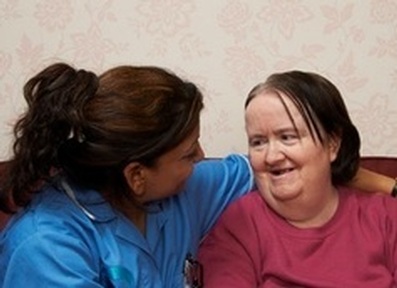Earlier diagnosis of dementia in people with learning disabilities urgently needed
A group of voluntary sector organisations has called for earlier diagnosis of dementia for people with learning disabilities, so they can receive better support.

VODG (Voluntary Organisations Disability Group) has published a report called ‘Staying put: developing dementia-friendly care and support for people with a learning disability’ which looks at how best to support the growing number of people with learning disabilities with the condition.
The report reveals that the diagnosis of dementia in the general population is at its highest level. However people with learning disabilities are five times more likely than those without to develop dementia, yet they are less likely to receive a timely diagnosis.
This is partly due to the fact they may show behavioural changes rather than memory loss initially and their dementia symptoms may be seen as symptoms of their learning disability.
Foundation for People with Learning Disabilities programme lead Christine Burke believes early diagnosis is “key to ensuring that those there to support them receive the right training and are able to plan for the future”.
She added: “Person centred planning is crucial in supporting people to make their life preferences known and this to be the guiding principle for health and social care in putting the appropriate support in place.”
VODG points out that the population of people with learning disabilities is growing due to living longer lives because of improvements in health and clinical practice and says there is a need to improve policy, planning and research in relation to people with learning disabilities and dementia.
Alzheimer’s Society chief executive Jeremy Hughes welcomed the report and said: “We know that a timely diagnosis is essential for anyone who has dementia. For people with a learning disability, who are at higher risk of developing dementia at a much younger age, there is an even greater need and services have a responsibility to develop their knowledge and awareness of dementia to ensure they can recognise it, diagnose it and put in place the support and services that people with learning disabilities and their families have a right to expect in order to help them live well.”
VODG members are taking practical steps to develop an evidence-based approach to offering high quality care and support services tailored to the needs of people with learning disabilities and dementia, according to Dr Rhidian Hughes, VODG’s chief executive, who added: “The challenge is to enable people with learning disabilities and dementia to continue to be supported in the ways in which they decide. And, as people’s condition progresses, there must be good access to specialist services.”
To view the report go to https://www.vodg.org.uk/wp-content/uploads/2017-VODG-Staying-put-developing-dementia-friendly-care-and-support-for-people-with-a-learning-disability.pdf
Latest News Analysis
 04-Sep-19
Extra £1.5 billion announced for social care in Chancellor's Spending Review
04-Sep-19
Extra £1.5 billion announced for social care in Chancellor's Spending Review
 02-Jul-19
Department of Health forced to rethink care homes' nursing rates after legal challenge
02-Jul-19
Department of Health forced to rethink care homes' nursing rates after legal challenge
 18-Jun-19
Overnight care workers forced to sleep in offices and told 'bring your own bedding'
18-Jun-19
Overnight care workers forced to sleep in offices and told 'bring your own bedding'
 14-Jun-19
Back in the closet: Third of care home staff have had no LGBT+ awareness training
14-Jun-19
Back in the closet: Third of care home staff have had no LGBT+ awareness training
 11-Jun-19
PM candidates on social care: Rory Stewart calls fixing care an 'unfinished revolution'
11-Jun-19
PM candidates on social care: Rory Stewart calls fixing care an 'unfinished revolution'